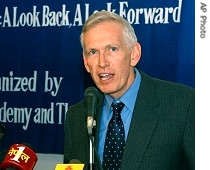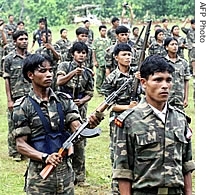2007年VOA标准英语-US Ambassador to Nepal Says Maoists Biggest Thr(在线收听)
Kathmandu
09 July 2007
The U.S. ambassador to Nepal says the Maoist party remains the biggest threat to holding peaceful elections in November. He says the Maoists are still considering violence as a way to gain absolute control of Nepal if elections and a role in the government do not deliver power. Liam Cochrane reports from Kathmandu.
 |
| James Moriarty |
Moriarty, who leaves Nepal this week after three years, told journalists the most serious threat to holding peaceful elections in November is the behavior of the former rebel Maoists.
"In fact if you look at their actions and their words closely, you would have to say that their intentions are not benign," he said. "They continue to use violence. They continue to threaten the process itself if they do not get everything that they want; and everything that they want is power, absolute power, not part of a multi-party democracy."
 |
| Nepalese Maoist rebels train at a camp in Makwanpur, south of Kathmandu (File) |
"In other words, one strategy says eat away at the government's will and have them hand you power, the other strategy says, 'No use the hammer, collapse the government's will'."
Moriarty says the Maoists are willing to use as much violence as necessary to achieve "absolute power" in Nepal.
The other major challenge to constituent assembly elections in November is ethnic tensions, particularly from the Madheshis community in southern Nepal, bordering India.
He says if rising militancy in the south is not addressed, there will be no chance of holding elections for a body to rewrite Nepal's constitution.
The United States has been a vocal critic of the Maoists and has been itself criticized for giving too much support to King Gyanendra after he seized control of the country in 2005.
After weeks of increasing street protests, the king was forced to give up power last year, and an interim multi-party government took over. The interim government invited the Maoist rebels to join it, and began a peace process to end the rebels' decade-long violent insurgency.
Moriarty says his biggest regret is trusting the king for too long once he took power.
"Basically, it looked to me he had no plan at all," the ambassador said. "He just wanted to grab power and figure out what to do with it later on and he never figured out what to do with it."
Moriarty said King Gyanendra also refused to listen to advice contrary to his wishes. He says the king's actions ultimately led to the 2006 uprising that forced him from power and gave a role in government to the rebels.